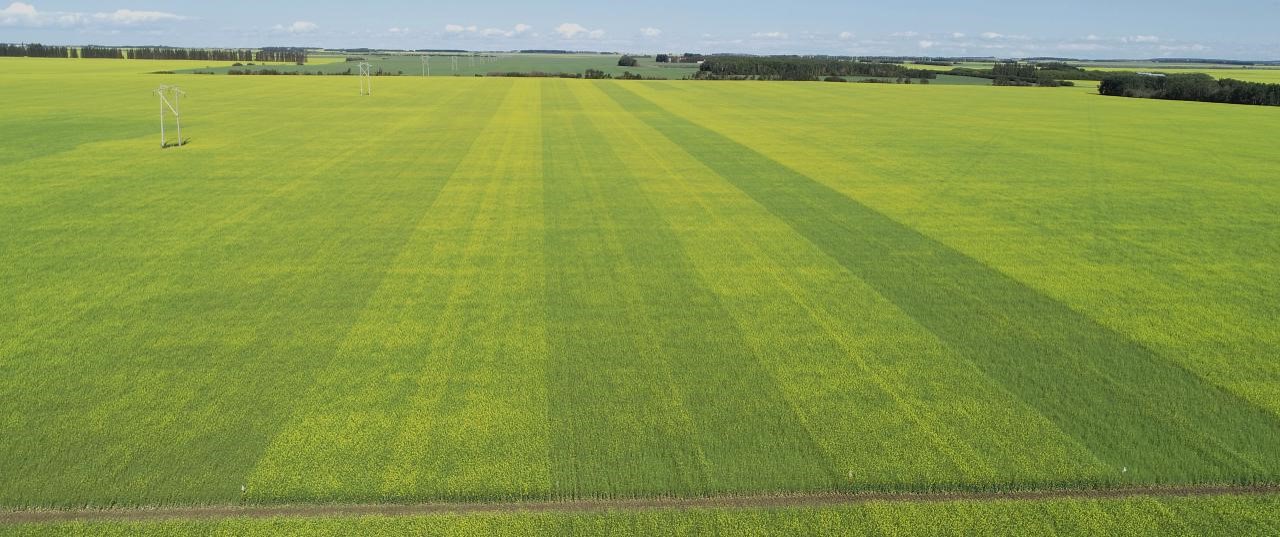© 2025, Nutrien Ag Solutions, Inc

Comparing apples to apples. That’s the benefit of attending summer tours that highlight new varieties. Tours are often the first chance farmers have to see how new varieties are performing head-to-head.
“Summer tours are a good time for farmers to get out and have a look at the new varieties, how they are performing in their local area, and how they compare to the varieties they are currently growing,” says Jim Anderson, research agronomist with Nutrien Ag Solutions at Calgary, Alberta.
Lyle Cowell, manager of agronomic services for Nutrien Ag Solutions in northeast Saskatchewan says variety selection is significant and during the busy summer season, attending tours may be difficult, but they are still important.
“I liken variety selection to picking out a new truck. Farmers spend tens of thousands of dollars on varieties each year. You wouldn’t go buy a $50,000 truck without doing your research and going on a test drive,” says Cowell.
Ask questions
To get the most out of variety tours, come armed with questions to help solve some of the challenges you might be having with a specific variety. If Fusarium head blight has been a problem, ask about variety resistant ratings. Is blackleg resistance in canola breaking down? Seek out management options from the researchers and agronomists, who can provide more than just advice on genetics.
“Tours are a great opportunity to ask questions. Get into discussions about variety performance like disease, quality, lodging, maturity and yield not only with the company representatives but also with other farmers,” says Anderson.
Given that yield is a primary driver for farmers when choosing new varieties, at first glance you would think that a summer tour isn’t the first place to look for new varieties. Farmers typically turn to company research data, Canola Performance Trials or Provincial Seed Guides to assess yield potential. What farmers can see at summer tours are agronomic traits that are hard to assess from looking at a fact sheet.
“I prefer to tour once the crop is fully podded or headed out when you can see differences in height, lodging and maturity. Disease differences might be evident. Being able to have a visual look at the varieties tends to be more meaningful when you can compare them in the field,” says Cowell. “As a follow up, you can then look at yields and other agronomic ratings after harvest and get a better overall feeling for the varieties.”
Building on variety registration trials
Anderson manages three Research, Development and Innovation (R, D & I) locations near Calgary. In addition to his research program, Nutrien Ag Solutions also has R, D & I hubs at Edmonton, Alberta; Watrous and Saskatoon, Saskatchewan; and Rosebank, Manitoba, each with multiple small plot research sites. These sites support the Proven Seed brand. Research sites grow small plot trials to generate data for plant breeders, and marketing and agronomy trials for front line staff and customers.
Canola, corn, soybean, forages and cereals, including wheat and barley, are planted at the sites, so data can be collected on the varieties to better understand the complete agronomic package.
“In our marketing trials we include the most widely grown varieties in each crop class in western Canada by acreage. I think it is a really good opportunity to get familiar with the popular varieties and to see how our Proven Seed varieties compare,” says Anderson.
Cowell, along with the 11 other managers of agronomic services at Nutrien Ag Solutions, helps farmers seed large strip trials as part of the Proven Performance Trial program. In 2019, Cowell had 18 farmers participate in the program, each seeding four to 10 new and existing Proven Seed varieties, as well as a competitive variety for comparison. These trials, seeded by farmers with their own equipment and management practices, provide another opportunity to see how varieties perform under a wide range of conditions. At some sites, experimental varieties are included to assess new genetics. With this addition, farmers can be assured that a new variety has already been assessed in farm fields and by farmers.
Going to more than one variety trial is important. Varieties perform differently across geographic areas and with different management practices.
“If there are 100 trial sites, the worst variety in one area may yield the best somewhere else,” says Cowell. “Agronomic characteristics can vary between sites, so make sure to take in a few variety tours.”
Another benefit of having hundreds of sites across the Prairies is that they provide a chance to look at an agronomic trait like blackleg resistance under a wide range of conditions.
“Sometimes we see the first evidence of blackleg on a canola variety in field variety trials,” says Cowell. “There are more touch points so it gives us a heads up on emerging issues and provides comparisons between varieties.”
